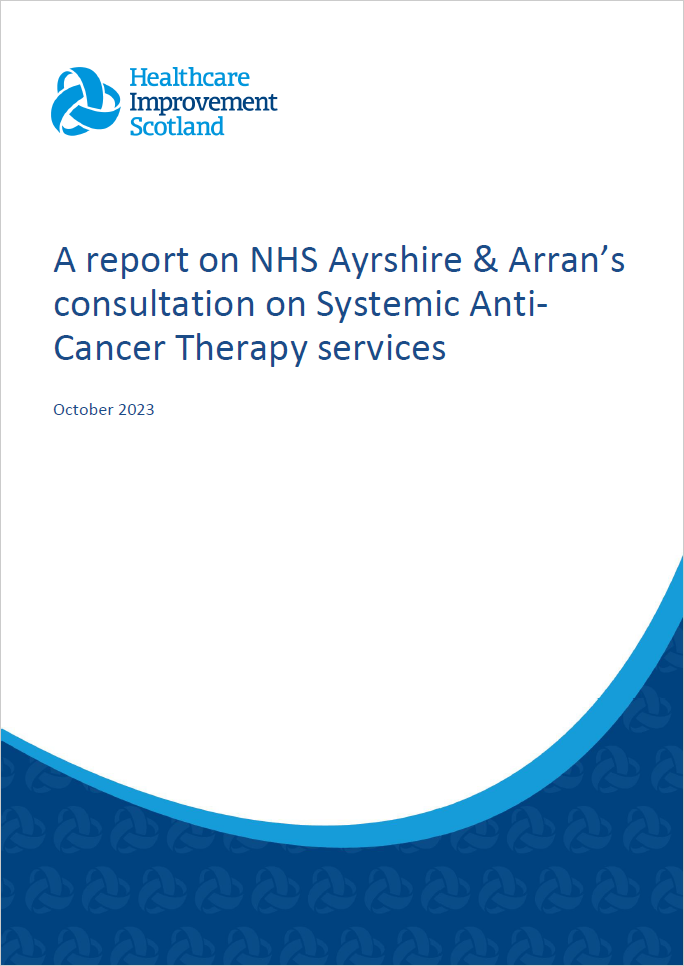Major service change reports
A report on NHS Ayrshire & Arran's consultation on Systemic Anti-Cancer Therapy services
This report provides our assessment on whether NHS Ayrshire & Arran has met the requirements and expectations around public engagement set out in national guidance, Planning with People, in its proposal to make permanent the temporary changes introduced to Systemic Anti-Cancer Therapy (SACT) services.
Systemic anti-cancer therapy is a collective term for all anti-cancer drug treatments such as chemotherapy and immunotherapy. As part of their consultation, which took place from 13 February to 19 May 2023, NHS Ayrshire & Arran included a range of online and face-to-face activities and ways for people to ask questions and give their views.
In undertaking our assessment, we:
- reviewed NHS Ayrshire & Arran's consultation plans and information
- observed at public consultation events
- reviewed local and social media coverage
- asked people for their views on the consultation process through an online survey and phone interviews
Based on the findings outlined in this report, our view is that NHS Ayrshire & Arran's process has fully met the Planning with People guidance set out by Scottish Government and COSLA.
NHS Ayrshire & Arran's proposal, to make permanent the temporary changes to services which had been put in place during the COVID-19 pandemic, included:
- Moving Tier 3 SACT delivery from University Hospital Ayr to a refurbished unit on the Ailsa Hospital site. Patients in the University Hospital Ayr catchment receive their first 2 cycles of treatment at University Hospital Crosshouse.
- Tier 2 SACT inpatient services and high risk day case treatments moving from University Hospital Ayr and consolidated at University Hospital Crosshouse.
These changes are consistent with the West of Scotland Cancer Network (WoSCAN) model of care for SACT services.
The majority of people who responded to our public questionnaire felt that sufficient information had been given to enable them to understand the proposed changes and why NHS Ayrshire & Arran was considering making these temporary changes permanent. Most respondents felt they had the opportunity to give their views and ask questions, and that it was clear how a decision would be made.
In addition, all members of the Stakeholder Reference Group who responded to our questionnaire felt supported to take part in discussions. They felt their comments and feedback were taken into account by NHS Ayrshire & Arran and rated their experience of involvement in this work as ‘very good’.
We are aware that some people continue to have concerns regarding parking, transport and travel to University Hospital Crosshouse for the first 2 SACT cycles and inpatient services.
During this consultation there has not been the same level of political, public or media interest as NHS Ayrshire & Arran's engagement process in 2020 when similar SACT proposals were considered. For example, at that time, a local newspaper launched a public petition to "Save Station 15 at Ayr Hospital". There were no public petitions and associated media coverage during this consultation in 2023.
Based on the responses to our surveys, phone interviews and observations and in line with guidance, we have made recommendations to support the points raised during the consultation and to inform NHS Ayrshire & Arran's decision-making, communication of its decision and next steps.
Recommendations for NHS Ayrshire & Arran
- Actively consider all the views and suggestions of people and communities that have been put forward within the scope of the consultation and use this feedback to help inform the decision-making process. Board members should be open to revisit any previous planning assumptions and consider alternative suggestions that have emerged through the consultation. NHS Ayrshire & Arran should also consider how to respond to feedback and comments received out with the scope of the consultation relating to ongoing service improvement and patient experience.
- Provide feedback to people on how their views and feedback have been taken into account as part of any recommendations to be submitted to Scottish Government Ministers for final approval.
- Evaluate the engagement and consultation process, and consider the areas of good practice and learning points.
- Discuss with us how we may support any future plans for national, regional or temporary changes to services, to ensure there is meaningful, proportionate and timely engagement with local communities and groups, in line with national guidance.
If the board supports the proposal to make the current temporary changes permanent, we recommend that NHS Ayrshire & Arran:
- Continues to co-design solutions with people, communities and partners to help mitigate adverse impacts identified through the consultation responses or patient and carer experience, for example, parking and access at University Hospital Crosshouse, increased travel times and transport.
- Engages people, communities and Third Sector organisations on future developments of SACT services, for example, increasing the number of Tier 3 outreach facilities in other localities.
- Continues to review and update, as appropriate, the equality impact assessment to ensure there is no disproportionate impact on certain groups or individuals.
With the aim of contributing to continual improvement in the quality of public involvement activities in NHS Scotland, we have identified points which we hope will inform future practice. These are summarised in this report as areas of good practice and learning points.
It is our view, based on the work that NHS Ayrshire & Arran has taken forward, that they have met the requirements and expectations set out in national guidance. This includes making information publicly available, consultation activities and opportunities for people to participate, and the feedback received from participants.

